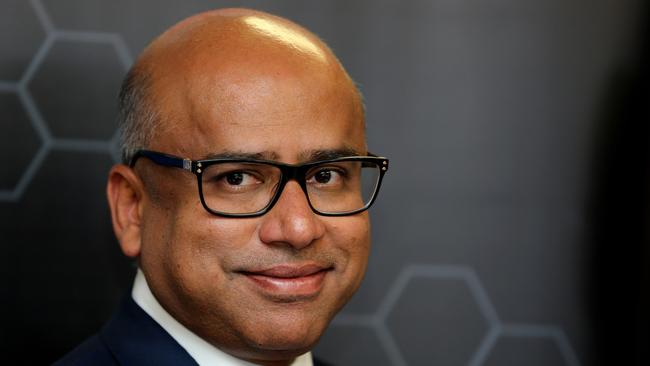Sanjeev Gupta’s powerful vision for reliable energy
Sanjeev Gupta has called on the government to ensure power supply during the transition to renewables.

Billionaire Sanjeev Gupta has urged the re-elected Liberal government to expand its underwriting generation scheme to include bigger slabs of power supply and help deal with the transition from coal to renewables.
The commodity tycoon, who rescued South Australia’s Whyalla steelworks from administration, said the government could play a critical role in backing the development of cheap but intermittent solar and wind supplies supported by firming generation sources like pumped hydro or gas.
The controversial underwriting mechanism was first recommended last year by competition regulator Rod Sims to bring a wider number of generation sources to the national power market.
While Mr Gupta is already part of the government’s taxpayer-funded shortlist, with a planned South Australian pumped hydro project, he wants a bigger scheme considered to ensure Australia can effectively move from its coal base to cleaner sources with minimal disruption.
“I’ve always been of the view that transitions need to be handled very carefully,” Mr Gupta told The Australian.
“You must have new, competitive generation before you get rid of legacy generation because life must carry on.”
The industrialist argued that while renewables will form the backdrop of the nation’s energy supply in the next decade due to their declining cost and carbon neutral qualities, large quantities of “firming” storage technologies should also be developed side-by-side to ensure the reliability of the nation’s electricity supply.
“I’m in favour of long-term government support for large generation,” Mr Gupta said.
“Solar is wonderful but it is not a 24/7 solution. You need pumped hydro and gas to smooth the supply curve and they require substantial investment.”
Mr Gupta argued that while power plants could run for 30 years or even 50 or 60 years if they were hydro-powered, they cannot be financed at normal market rates and may require additional government assistance to get off the ground: “We know renewables is economically viable but security of supply is even more important. So, with that in mind, we need to ensure the transition occurs in an orderly manner.”
Coal continues to prop up about 70 per cent of the national power grid but with many of the east coast’s ageing plants nearing the end of their life the government faces a test to ensure the grid can handle a boom of renewable supply into the system.
Mr Gupta’s London-based Liberty House has built a global steel and aluminium business in recent years by buying distressed assets.
He joined with his father’s SIMEC Group in 2017 to acquire the in-administration Whyalla steelworks and associated mines for about $700 million.
GFG has also bought a controlling stake in Ross Garnaut’s renewables company Zen Energy, through which it is pursuing a $1.5 billion green energy program, and also bought the Tahmoor coking coal mine in NSW.
Mr Gupta said Australia must use its abundant raw materials, world class infrastructure and educated workforce to push on and develop both its resources and manufacturing industries.
“I’m obsessed by the opportunity in Australia to create a large scale manufacturing industry and advanced manufacturing in copper and aluminium — [right] up to electric vehicles and a whole range of opportunities which exist,” Mr Gupta said.
“I’m very excited and passionate about seeing some of this come true and am hoping the government sees that as part of their ambition. I think everyone in Australia wants to see these industries thrive.”
The business magnate plans to develop Australia’s first electric car fleet from either a South Australian or Victorian factory.
He has implored Australia to grab what he described as “a golden opportunity” to build and become a leader in a new industry ahead of international rivals considering similar plans.

